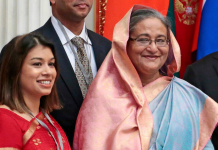Tokyo, :The long-distance road-running relay sport of ekiden is a national institution in Japan, where New Year’s races command massive TV audiences and turn unknown athletes into overnight stars.
Now ekiden’s greatest modern coach believes it can also become a global event on the Olympic stage — and even contribute to world peace.
Ekiden involves teams of runners covering long-distance relay stages of varying lengths, and have been held in Japan for more than a century.
The event took its inspiration from the samurai-era couriers who carried messages between Tokyo and the former imperial capital Kyoto.
Ekiden is virtually unknown outside of Japan, but Susumu Hara, head coach of the all-conquering Aoyama Gakuin University team, believes it can become popular around the globe.
“Connection,” he said, “is a word that resonates throughout sports around the world.
“A lot of places still have social conflict, but connecting people like we do in ekiden can play a part towards world peace.”
The sport’s flagship race is the Hakone Ekiden, contested by 21 university teams over two days on January 2 and 3 each year.
Races for professional teams also exist, but it is the student event that really captures the public’s attention, with millions watching on TV and more lining roads along the route.
Each of the teams’ 10 runners completes a section of the 135-mile (217-kilometre) return trip between Tokyo and the resort town of Hakone, handing over a coloured sash to their team-mate at each checkpoint.
Like cycling’s Tour de France, stages vary in length — some are flat and others involve punishing climbs up mountain roads.
The Hakone Ekiden is open only to universities in the greater Tokyo area. But its prestige is such that students from all over Japan choose to study at schools in the capital just so they can compete in the race.
“I used to be in my primary school baseball team, but then I watched the Hakone Ekiden with my family and I wanted to run in it too — that’s why I took up running,” said Takayuki Iida, the Aoyama Gakuin captain.
“Every time I run in the race, I want to run in it even more the next year. It really is the stuff of dreams.”
Journalist Takeshi Nishimoto, of Ekiden News, says some runners have even been known to quit their jobs and return to university so they can run again.
He says the team nature of ekiden strikes a chord with many Japanese.
“People say the Japanese don’t have individuality, but I think one thing people like about the race is that within a team, their personalities come out,” said Nishimoto.
“Having the right person in the right position is something that really resonates with Japanese people.”
Reports say last year’s race was watched on TV by almost 65 million people — the biggest audience since live broadcasts began in 1987.
For runners like Ryuji Kashiwabara, who became known as “the God of the Mountains” after helping Toyo University win the race three times between 2009 and 2012, it can be a life-changing experience.
“People suddenly started speaking to me on the train or when I was out for dinner, and people would take pictures of me when I went back to my home town,” said Kashiwabara.
“I realised it wasn’t just me thinking about what I had done — everyone was going crazy about it.”
Kashiwabara says the advent of social media has brought even more attention to today’s athletes, but their fame can be fleeting and few go on to become Olympic stars.
Nishimoto says many quit running after achieving their life’s goal of competing in the Hakone Ekiden.
Others find it difficult to make the transition to the individual marathon or long-distance track events.
Hara, who coached Aoyama Gakuin to their sixth title in eight years on Monday, would like to see ekiden included in the Olympic programme one day.
But first he wants to see reforms in Japan, starting by opening up the Hakone Ekiden to universities from around the country as well as professional teams.
“First we need to make sure we do it right at home,” he said.
“If we do that, a bigger effort to take it to the Olympics and make it a global event will follow as a matter of course.”
















